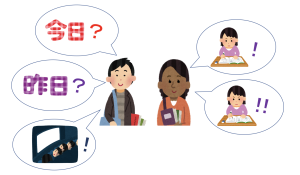Module 34.1 Dialogue
Title
Naomi Johnson and Takeshi Yamada talk about their activities today and yesterday

| Language |
Script & Translation
|
Japanese |
|
Romanization |
1 Yamada: Kyou wa nani o shimasu ka?
2 Jonson: Benkyou o shimasu. 3 Yamada: Sou desu ka? Kinou wa nani o shimashita ka? 4 Jonson: Kinou mo benkyou o shimashita. 5 Yamada: Sou desu ka? Watashi wa eiga o mimashita yo. Ichijikan gurai mimashita. |
English translation |
1 Yamada: What are you doing today?
2 Johnson: I am going to study 3 Yamada: Is that so? What did you do yesterday? 4 Johnson: I also studied yesterday. 5 Yamada: I see! I watched a movie, you know! I watched it for about an hour. |
Vocabulary
More Useful Words: Verbs and Nouns
Grammar Notes
| Past tense of verbs |
Watch the following video to learn more about Japanese verbs in the past tense.
You can also read below to learn how to conjugate verbs from their present polite forms to past polite forms.
| Affirmative | Negative | ||
| Present | Past | Present | Past |
| たべます | たべました | たべません | たべませんでした |
| tabemasu | tabemashita | tabemasen | tabemasendeshita |
| will eat | ate | will not eat | did not eat |
| Affirmative | Negative | ||
| Present | Past | Present | Past |
| のみます | のみました | のみません | のみませんでした |
| nomimasu | nomimashita | nomimasen | nomimasendeshita |
| will drink | drank | will not drink | did not drink |
| Affirmative | Negative | ||
| Present | Past | Present | Past |
| します | しました | しません | しませんでした |
| shimasu | shimashita | shimasen | shimasendeshita |
| will do | will not do | did | did not do |
Summary:
To change a verb in the affirmative form from present tense to past tense: change ます to ました
To change a verb in the negative form from present tense to past tense: change ません to ませんでした
| #時間 |
#時 is used to tell time on the hour.
#時間, however, is used to describe the length of time.
| Japanese | 今日は三時間テニスをします。 |
| Romanization | kyou wa sanjikan tenisu o shimasu. |
| English | Today I will play tennis for three hours. |
きょう
なに
べんきょう
きのう
わたし
えいが
み
いちじかん
じかん
じ
